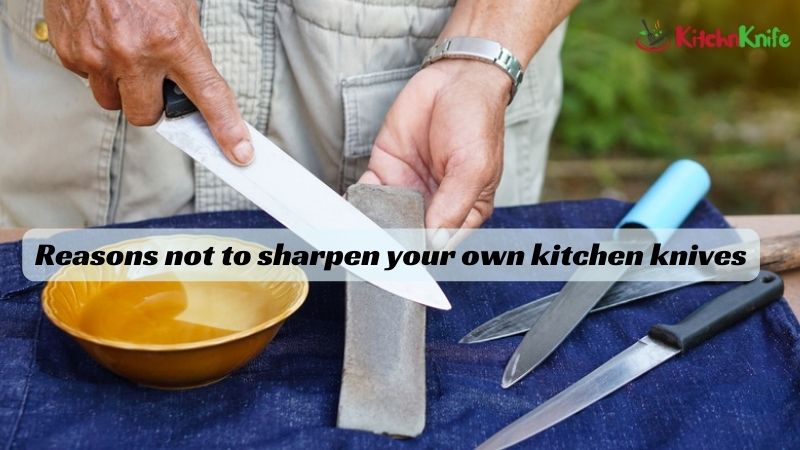Last Updated on May 23, 2025 by Susanna Zuyeva
Sharp knives are essential in any kitchen. A sharp knife helps you slice tomatoes cleanly, chop herbs quickly, and cut meat safely. But while having sharp knives is important, sharpening them yourself may not be the best idea.
Here’s why sharpening your own kitchen knives could do more harm than good.
You Probably Don’t Have the Right Tools
Most people don’t have the proper sharpening tools at home. A basic steel rod or pocket knife sharpener might work for a quick fix, but they’re not ideal for maintaining kitchen knives.
A whetstone or sharpening stone is what professionals use. These tools need skill and care to use correctly. If you use the wrong tool or technique, you can damage the edge of your blade.
Even if you have a knife block full of great tools, a poor-quality sharpener can turn your sharp knife into a dull one fast.
Sharpening Angle Matters More Than You Think
Every knife has a specific sharpening angle. A Japanese knife usually has a finer edge, requiring a precise angle of about 15 degrees. Western knives, like a Misen knife, may use a 20-degree angle.
Sharpening a knife at the wrong angle can flatten or chip the blade. Worse, it shortens the knife’s life. Blade sharpening takes precision, and that’s hard to get right without training and experience.
You Risk Ruining Expensive Knives
Good knives aren’t cheap. A full knife set might include a chef’s knife, a paring knife, and even a specialty blade for meats. Japanese knives, in particular, are known for their craftsmanship and delicate edges.
Sharpening these at home without the right tools or skills can cause chips, uneven edges, or even cracks in the steel. The cost of replacing a single knife often outweighs the price of a professional sharpening service.
It’s Easy to Hurt Yourself
A dull knife is dangerous because it slips. But sharpening a knife without training is risky too. You could slip and cut yourself badly.
If you’re using a sharpening stone or whetstone, the process takes time and focus. A small distraction or wrong move can lead to an accident.
Even experienced home cooks can injure themselves while trying to get the perfect edge.
Professionals Make Knives Last Longer
Sharpening services have the right equipment and know-how. They keep a steady sharpening angle and treat each knife the way it should be treated.
Professional sharpening can bring your dull knife back to life without removing too much steel. That means your knife lasts longer.
Instead of damaging your blade, a sharpening service keeps your knife sharp, balanced, and reliable for years.
You Might Think It’s Sharp But It’s Not
After sharpening at home, your knife might feel a little sharper. But is it really sharp?
A true sharp knife should slice through a piece of paper or tomato with no effort. Many DIY sharpening jobs leave the edge uneven or still dull in places.
This “false sharpness” can be frustrating in the kitchen. It slows you down and makes cooking harder than it needs to be.
Final Thoughts: Leave It to the Pros
A sharp knife is a joy to use. It makes cooking safer, faster, and more fun. But sharpening your own knives is tricky and risky.
Without the right sharpening tools, knowledge of sharpening angles, and steady hands, you could damage your favorite knife or hurt yourself.
Instead, trust a professional sharpening service. They’ll keep your knives in top shape, protect your investment, and give you the best cutting experience possible.
FAQs: Reasons Not to Sharpen Your Own Kitchen Knives
1. Is it bad to sharpen kitchen knives at home?
Yes, sharpening kitchen knives at home can be risky if you don’t have the proper tools or experience. Using the wrong sharpening angle or tool can damage the blade and reduce its lifespan.
2. What tools are needed to sharpen a knife correctly?
Professionals use tools like whetstones or high-quality sharpening stones. These require training to use properly. Basic tools like steel rods or pocket knife sharpeners are not suitable for precision sharpening.
3. Why is the sharpening angle important?
Each knife is designed with a specific sharpening angle. For example, a Japanese knife often uses a 15° angle, while Western knives may use 20°. Using the wrong angle can ruin the edge and make the knife unsafe.
4. Can sharpening my knife at home damage expensive knives?
Yes. High-end knives, such as those in a full knife set or a Misen knife, can be permanently damaged by incorrect sharpening methods. It’s often more cost-effective to use a professional sharpening service.
5. Are professional sharpening services worth it?
Absolutely. A professional sharpening service ensures the correct angle, preserves the steel, and extends the life of your knives. It also saves you time and reduces the risk of injury.

